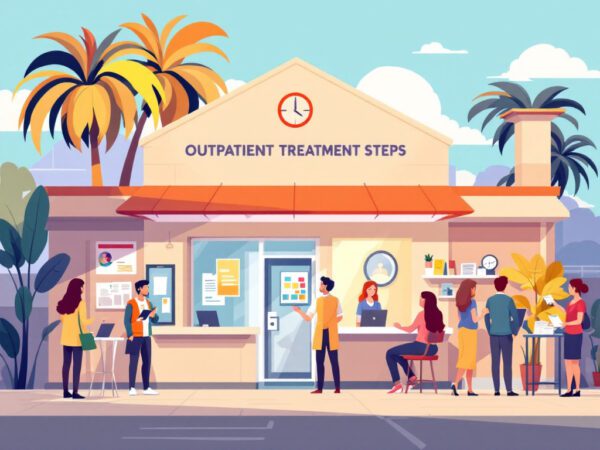Understanding Yoga Therapy
In our exploration of treatment options for addiction, we emphasize the importance of yoga therapy as an effective outpatient component. This holistic approach does not operate under conventional biomedical models but focuses on nurturing the whole individual.
Principles of Yoga Therapy
Yoga therapy is rooted in a personalized and goal-oriented philosophy. It utilizes principles that emphasize an individual’s unique needs and circumstances. Unlike traditional medical modalities such as physical therapy or psychotherapy, yoga therapy focuses on restoring balance within the entire system—mind, body, and spirit—by employing practices such as breathing techniques, mindfulness, and meditation.
The fundamental tenets of yoga therapy include:
- Individualized Approach: Each therapy session is tailored to the individual’s health condition and life context, considering factors such as family, support network, and cultural background.
- Holistic Health Orientation: The therapy encompasses a full range of yogic practices aimed at understanding and addressing the underlying causes of physical or emotional health issues.
Benefits of Yoga Therapy
Engaging in yoga therapy presents numerous advantages, particularly for those dealing with addiction. The benefits not only pertain to physical health but also extend to emotional and psychological well-being. Here are some key benefits:
| Benefit | Description |
|---|---|
| Mindfulness Enhancement | Yoga therapy encourages mindfulness and self-awareness, promoting a state of being fully present. This is especially helpful in treating addiction, facilitating open communication in family and group therapy settings (Greater Boston Behavioral Health). |
| Stress Reduction | Various breathing and relaxation techniques taught in yoga therapy significantly reduce stress levels, leading to improved coping mechanisms for individuals undergoing recovery. |
| Symptom Management | The therapy helps in reducing, managing, or eliminating symptoms related to addiction, improving overall mental health. |
| Improved Functionality | It fosters an increase in physical functionality, thus aiding individuals in regaining control over their lives. |
These benefits highlight yoga therapy’s role as an integral part of our comprehensive approach to addiction treatment, aligning perfectly with our detox and rehab programs at Totality Treatment. Each practice session acts as a stepping stone towards personal healing and recovery. By integrating yoga therapy into our approach, we empower individuals to harness their inner strengths and navigate the challenges of recovery more effectively.
Medical Yoga Practices
Individualized Approach
In our exploration of yoga therapy outpatient programs, we prioritize an individualized approach to treatment. Each person’s journey through addiction recovery is unique, which is why a tailored regimen is essential for success. Medical yoga therapy emphasizes personalized methods by considering various factors such as the individual’s mind, body, spirit, family, support network, work situation, and cultural background. This multifaceted strategy aims to address the underlying causes of addiction and support overall well-being.
By incorporating specific practices such as breathing techniques, yoga postures, mindfulness, and meditation, we can adapt the therapy to meet the unique needs of each participant. This customized treatment plan ensures that the goals align with the individual’s recovery process, ultimately leading to more effective outcomes (NCBI).
Holistic Healing Methods
Holistic healing methods play a vital role in our yoga therapy outpatient programs. We approach addiction as a condition that affects the entire individual—not just the physical aspect. Our yoga practices incorporate techniques designed to promote healing across various dimensions of health, including physical, mental, emotional, and social well-being.
The integration of various yoga therapy practices—like mindfulness meditation and appropriate physical postures—benefits not only the body but also fosters a positive mental state. These methods help regulate stress levels, manage emotional reactions, and enhance psychological resilience. Ultimately, the aim is to create a balanced and harmonious state in which individuals can thrive without reliance on substances (Source).
By focusing on both individualized and holistic approaches, our rehabilitation programs offer comprehensive support for those battling addiction. Our commitment to understanding and addressing the various aspects of a person’s life is central to fostering effective recovery outcomes, ensuring that participants feel seen, heard, and supported throughout their journey. For more insights on various therapeutic methods, consider exploring options like cognitive behavioral therapy and mindfulness-based therapy.
Yoga Therapy for Mental Health
Yoga therapy offers transformative techniques that can greatly benefit individuals dealing with mental health challenges, particularly those in recovery from addiction. Focusing on stress reduction and emotional regulation, we can leverage these techniques as part of our holistic approach to treatment.
Stress Reduction Techniques
Scientific research indicates that yoga significantly reduces stress and anxiety through its focus on controlled breathing and mindful movement. These practices are particularly effective when combined with evidence-based therapies such as cognitive behavioral therapy (CBT) and dialectical behavior therapy (DBT) (Greater Boston Behavioral Health).
Engaging in yoga allows individuals to physically release tension and promote relaxation. This is accomplished through various postures and breathing techniques, which can help regulate stress hormones and enhance overall well-being. Here’s a summary of some common yoga practices used for stress reduction:
| Technique | Description | Benefits |
|---|---|---|
| Deep Breathing | Focused, slow inhalation and exhalation | Lowers heart rate, reduces stress |
| Gentle Asanas | Simple postures to release bodily tension | Improves flexibility, calms the mind |
| Mindful Meditation | Focus on present moment awareness | Enhances self-awareness, reduces anxiety |
Emotional Regulation Benefits
Yoga therapy enhances emotional regulation, providing individuals with vital skills for recovery. By integrating yoga into our treatment plans, we support clients in building emotional resilience, an essential factor for long-term recovery. Participants learn transferable skills that can be applied in real-life situations, including conflict resolution and resisting unhealthy urges (Greater Boston Behavioral Health).
Practicing yoga helps individuals reconnect with their bodies, calming the mind and allowing for better recognition of emotional triggers. Here are some specific emotional regulation benefits from yoga therapy:
| Benefit | Description |
|---|---|
| Improved Self-Awareness | Clients recognize emotional triggers and responses |
| Increased Resilience | Builds capacity to cope with stress and challenges |
| Enhanced Emotional Skills | Teaches techniques for emotional expression |
Through yoga, individuals gain insights into their emotional patterns, helping them develop healthier coping mechanisms. We incorporate these valuable therapeutic practices into our comprehensive treatment programs, ensuring our clients can experience both the physical and psychological benefits of yoga. Additionally, we encourage exploring complementary practices such as mindfulness-based therapy and group therapy for addiction to optimize recovery potential.
Incorporating Yoga in Addiction Treatment
Role of Yoga in Recovery
Integrating yoga into addiction treatment offers a powerful tool for recovery. It assists individuals in reconnecting with their bodies, regulating emotions, and calming their minds. This process is essential for individuals in recovery as it enables them to develop self-awareness, helping them recognize triggers and adopt healthier coping mechanisms. Yoga therapy not only focuses on physical postures but also emphasizes emotional regulation, fostering resilience that is critical for overcoming addiction (The Ridge Ohio).
Yoga encourages participants to embrace mindfulness throughout their recovery journey. By being fully present in the moment, individuals can navigate their feelings and reactions while engaging in the healing process. This heightened state of awareness is particularly beneficial in comprehensive treatment programs, contributing to improved emotional health and empathy towards oneself and others. This aligns with the principles of integrative healthcare, which combines traditional medical practices with complementary therapies for holistic well-being (beYogi).
| Benefits of Yoga in Recovery | Description |
|---|---|
| Emotional Regulation | Helps individuals build resilience and learn skills transferable to real-life challenges. |
| Enhanced Mindfulness | Promotes being present, aiding in recognizing triggers and managing cravings. |
| Holistic Approach | Focuses on improving overall health by addressing mind, body, and spirit. |
Mindfulness and Self-Awareness
Mindfulness is a fundamental component of yoga that plays a significant role in addiction recovery. It fosters self-awareness by encouraging individuals to observe their thoughts and feelings without judgment. This ability to reflect on one’s emotional state allows for healthier decision-making, especially during moments of temptation or relapse. Through mindfulness practices, individuals can learn to navigate difficult emotions and situations with greater clarity and poise.
As individuals engage in mindfulness exercises, they often discover new insights about themselves, illuminating patterns of behavior that may hinder recovery. This self-awareness promotes open communication and empathy, enhancing relationships with peers, family, and support systems which is vital in any recovery program. Many treatment modalities, including family therapy and group therapy, can benefit from the principles of mindfulness established through yoga.
| Mindfulness Benefits | Description |
|---|---|
| Emotional Insight | Increases understanding of personal feelings and triggers. |
| Improved Relationships | Enhances communication and empathy towards others. |
| Conflict Resolution | Teaches strategies for managing disputes without resorting to negative behaviors. |
Incorporating yoga therapy outpatient into addiction treatment can significantly support an individual’s recovery journey, providing tools for emotional resilience and mindful living. For those interested in exploring such options further, Totality Treatment offers various programs designed to address individual needs effectively.
Personalized Yoga Sessions
At Totality Treatment, we understand the importance of personalized care in the recovery journey. Our yoga therapy sessions are structured to meet individual needs, whether through one-on-one therapy or small group practices.
One-on-One Therapy
One-on-one yoga therapy sessions are designed to provide tailored guidance to each participant. These sessions focus on specific health issues and individual goals, incorporating elements of counseling and mindfulness. Certified yoga therapists conduct these personalized assessments to ensure that the techniques used are effective and relevant to each individual’s needs (The Ridge Ohio).
Through personalized yoga therapy, clients can:
- Develop a deeper understanding of their physical and emotional states
- Set achievable wellness goals
- Learn yoga practices that specifically address their challenges
This individualized approach promotes healing and encourages clients to engage actively in their recovery process.
Small Group Practices
In addition to one-on-one sessions, we offer small group yoga practices. These sessions provide a supportive environment where participants can share their experiences while still receiving individualized attention. Small group settings foster connection and community among those facing similar challenges, enhancing the therapeutic experience.
The benefits of small group practices include:
- Shared learning experiences that promote empathy and support
- Opportunities to practice yoga techniques together, encouraging motivation
- A focus on collective goals while still addressing individual needs
Yoga therapy can be a transformative addition to our treatment approach, combining physical practices with therapeutic support. For those interested in integrating mindfulness into their recovery journey, our sessions align well with other therapeutic modalities such as cognitive behavioral therapy and mindfulness based therapy.
We encourage anyone considering yoga therapy outpatient services to reach out to learn more about how our programs can meet their specific recovery needs.
The Science Behind Yoga Therapy
Research Findings
Numerous studies have demonstrated the efficacy of yoga therapy in various health domains. Research indicates that yoga can help regulate blood glucose levels, improve musculoskeletal conditions, and enhance cardiovascular health. In addition to physical benefits, yoga delivers significant psychological advantages, including reductions in feelings of aggressiveness, depression, and anxiety. A study focusing on outpatients with clinical depression highlighted that participants engaging in yoga therapy experienced greater decreases in cortisol levels compared to those undergoing drug therapy. This correlation suggests a positive antidepressant effect from yoga practice, as decreased cortisol levels were associated with lower depression scores (Source).
Furthermore, regular practice has been linked to increased levels of anti-inflammatory substances like leptin and adiponectin in the body. These substances help reduce inflammation and support overall health. For instance, in a randomized controlled trial involving breast cancer survivors, those who practiced yoga for just three months saw a reduction in inflammatory markers, leading to lower fatigue levels and improved vitality scores.
| Research Highlights | Key Findings |
|---|---|
| Impact on Depression | Yoga practice correlates with decreased cortisol levels and lower depression scores. |
| Inflammation Reduction | Increased leptin and adiponectin levels leading to reduced inflammation markers. |
| Cancer Survivorship | Lower inflammatory markers and improved vitality in breast cancer survivors practicing yoga. |
Integration in Healthcare Programs
Integrating yoga therapy into healthcare programs offers a holistic approach to addiction treatment. By combining yoga postures, breathing techniques, and meditation, this practice supports detoxification, reduces withdrawal symptoms, and addresses the physical, mental, emotional, and spiritual dimensions of healing in addiction treatment. Programs that include yoga therapy often experience higher patient engagement and satisfaction, making it a valuable component in recovery pathways.
Healthcare providers increasingly incorporate yoga therapy into addiction treatment protocols, recognizing its potential to enhance traditional interventions. For those interested in more options, we offer various individual therapy and group therapy addiction sessions that blend evidence-based practices with holistic methods. By adopting a multifaceted approach to recovery, we can enhance the support and resources available to those seeking to overcome addiction.















